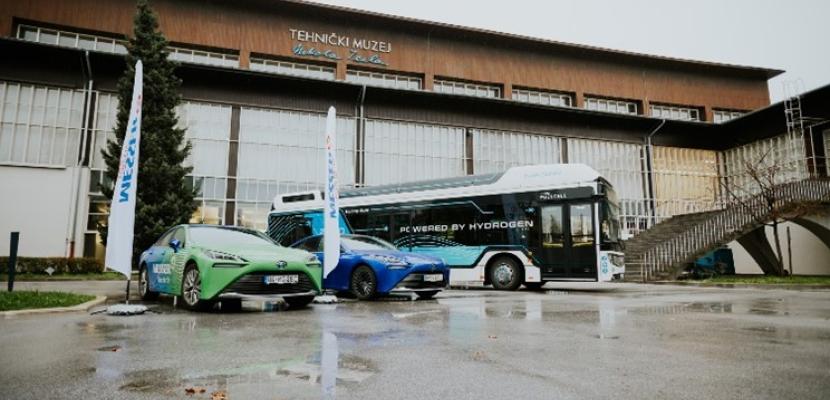
Croatia piloting hydrogen-powered bus in public city transport

About this good practice
Fuel cell buses (FCBs) are one of the few options for cities and regions across Europe seeking zero emission vehicles. However, the number of FCBs operating in Europe has remained rather small. Although significant progress has been made in terms of FCB efficiency, the level of operational experience with the technology has been relatively limited. Since the uptake of FCBs has been significantly higher in Western Europe, JIVE 2 organised a side activity in the form of a bus roadshow across selected cities in CEE (Slovenia, Croatia, Czech Republic, Slovakia and Hungary).
The aim was to provide an opportunity to showcase the technology and allow cities to experience and test it. The FCB was provided by Caetano and the mobile refuelling station by Messer. Each city stop lasted up to one week, including a national workshop to discuss key issues and share experience for the deployment of FCBs in CEE countries. Through this roadshow, the City of Zagreb and its public transport operator (ZET) got the opportunity to test the technology in actual driving conditions (in urban and suburban Zagreb area).
Main stakeholders in Croatia: City of Zagreb and its public transport operator (Zagreb Electric Tram ltd.- ZET), Croatian Hydrogen Association (national roadshow coordinator), Croatian Hydrocarbon Agency (roadshow project partner). Main beneficiaries: all abovementioned, other national, regional and local authorities, academia, public and media, local citizens.
Expert opinion
Fuel Cell Buses are an emerging option for the provision of low-carbon public transport, though the technology is still not fully mature, with further scaling up required, and particular efforts needed in the production of green hydrogen. However, cities can already begin to prepare by demoing and piloting technologies to gain hands on experience in real conditions. This example, with hydrogen buses and mobile refuelling stations, enabled Zagreb city and its public transport company to get first experiences and build confidence in the technologies, build connections between relevant actors, and raise awareness amongst the public. This will help to set the stage for later adoption of new hydrogen fleets. Such practices can help to achieve EU policy goals of reducing carbon emissions and promoting clean transport as set out in the Clean Vehicles Directive.
Resources needed
This roadshow was a side activity under the JIVE2 project (Joint Initiative for hydrogen Vehicles across Europe 2) that received funding from the Clean Hydrogen Partnership.
Total JIVE2 project budget amounted to 25 million EUR.
Evidence of success
Bus drove across 5 countries, travelling a total distance of 1641 km, consuming app. 125 kg of H2 with an average consumption of 7,6kg/100km; 13 events (national workshops, media events) attended by over 900 participants; Media outreach: 2,6 mil people (articles, TV, radio); Hydrogen bus tested in Zagreb in extreme operating conditions (below 0ºC, hilly terrain) showing excellent results in terms of efficiency; 150 hydrogen buses expected to be deployed in the region over next years.
Potential for learning or transfer
The roadshow was pivotal since it initiated local value chain discussions and demonstrated the benefits of hydrogen mobility. The hydrogen bus testing was an opportunity for relevant authorities to confirm that the deployment of hydrogen buses is an advantageous option. Hydrogen, used in buses with fuel cells, enables high performance and provides comfort for passengers without GHG emissions and other harmful gases, particles and noise. In addition, the roadshow helped to reduce preconceptions about the safety of the technology and environmental performance. It also contributed to the creation or strengthening of collaboration between various stakeholders (bus testing, national workshops) having significant media outreach.
As such, this example of good practice could be replicated in other countries/regions or in the context of cross-border cooperation.

